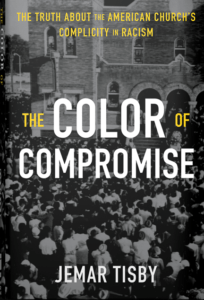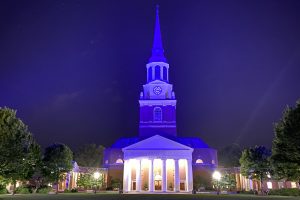 In his 2019 book, The Color of Compromise: The Truth about the American Church’s Complicity in Racism, University of Mississippi doctoral candidate Jemar Tisby describes his purpose:
In his 2019 book, The Color of Compromise: The Truth about the American Church’s Complicity in Racism, University of Mississippi doctoral candidate Jemar Tisby describes his purpose:
This book is about revealing racism. It pulls back the curtain on the ways American Christians have collaborated with racism for centuries. By seeing the roots of racism in this country may the church be moved to immediate and resolute antiracist action.
Tisby’s study surveys the history of racial discrimination and injustice in America from the colonial era to the present, particularly the “complicity” of Christian people and churches in supporting slavery, Lost Cause mythology, Jim Crow segregation and white supremacy, as well as in contemporary voter suppression and racial inequities in education, housing and economics.
“Tisby’s conclusions offer important insights for confronting American racism past and present.”
My formal review of Tisby’s book will be published later this year in the American Baptist Quarterly. Reading the book was a painful literary and personal experience, since it documents the ways in which white Christians and ecclesiastical institutions inside and outside the South manifested, acquiesced to and facilitated racist responses to people of color in general and African Americans in particular.
Tisby’s research details disturbing facts like these:
- White colonials “compromised the message of Christianity to accommodate slavery,” evangelizing slaves to fulfill Jesus’ mandate “to make disciples of all nations,” freeing their souls for heaven, but withholding liberation on earth. In this way, Tisby notes, “a corrupt message that saw no contradiction between the brutalities of bondage and the good news of salvation became the norm.” Even revivalists like George Whitefield and Jonathan Edwards advocated evangelization of slaves but with a gospel that “did not extend to advocating for physical emancipation.”
- The Bible was consistently utilized to lend divine authority to slave-holding culture, centered in the supposedly munificent intent of the “Christian master.” Tisby observes, “Under paternalistic Christianity, the slave plantation was seen as a household, with the male enslaver as the benevolent patriarch of both his family and his ‘pseudofamily’ of enslaved black people.” Chattel slavery was thus an early form of biblical “complementarity,” in which slaves and Christian (male) owners were assigned roles in the divine “order of creation.”
 As 19th-century evangelical sects became more embedded in American culture, many white denominations asserted the church’s “spiritual” calling to Christianize slaves while distancing themselves from the “political” debates over slavery or manumission. In 1790 the Baptist General Committee of Virginia voted “by a majority (after considering it a while) that the subject [of slavery] be dismissed from the committee, as believing it belongs to the legislative body.” Slave ownership thus became officially acceptable in Virginia Baptist congregations.
As 19th-century evangelical sects became more embedded in American culture, many white denominations asserted the church’s “spiritual” calling to Christianize slaves while distancing themselves from the “political” debates over slavery or manumission. In 1790 the Baptist General Committee of Virginia voted “by a majority (after considering it a while) that the subject [of slavery] be dismissed from the committee, as believing it belongs to the legislative body.” Slave ownership thus became officially acceptable in Virginia Baptist congregations.- Southern Presbyterian leader James Henry Thornwell insisted that churches had “no commission to construct society afresh . . . to re-arrange the distribution of its classes, or to change the forms of its political constitutions.” Social justice was not in the church’s purview.
- Christianity became a tool in shaping Lost Cause myths as a means of “redeeming” the post-Reconstruction South, actions that aided the rise of the Ku Klux Klan and its violent assertion of white supremacy, movements that “contributed to the cultural disenfranchisement of [emancipated] black people as they sought to participate as equals.” Tisby shows how the Klan “interspersed Christianity with racism to create a nationalistic form of religion that excluded all but American-born, Protestant white men and women.”
- The Klan’s renewal from “the 1910s through the 1930s was far from marginal,” evidenced in its use of “lynching, rape, and intimidation to keep undesirable people groups [blacks, Jews, Catholics] in their place.” Tisby describes in horrific detail a few of the thousands of these illegal public executions, incidents that involved the lynching, torture and burning of African Americans declared guilty without due process.
- With Jim Crow legislation, many white Christians, North and South, promoted or assented to segregationist policies in housing, education, employment and economics. While some white ministers did support Civil Rights efforts, many Southern “moderates” failed “to recognize the daily indignity of American racism” as well as the long history of violence against the black race.
Tisby’s conclusions offer important insights for confronting American racism past and present. First, “we must remember that racism never goes away; it adapts.” Second, “a few decades of legal freedom have not corrected the damage done by centuries of racism.” Third, “centuries of racism in the American church cannot be overcome by ‘pious irrelevancies and sanctimonious trivialities’ that ignore the deep social, political, and cultural divides that persist across the color line.” Fourth, Tisby’s antidotes for responding to the legacy and immediacy of ecclesiastical racism include the following:
- “Take down Confederate Monuments” with their implicit links to white supremacy.
- “Learn from the Black Church,” communions that remain safe spaces for Christians of color.
- “Start a New Seminary” that would “embed racial equality into the identity of the institution” (and, I would add, encourage existing seminaries to do the same).
- “Host Freedom Schools and Pilgrimages” that “teach everyday Christians how to get involved in activism,” offering “spiritual ventures that challenge the participants to make sense” of historic shrines to racial justice.
- “Make Juneteenth a National Holiday” recalling June 19, 1865, when slaves in Texas finally received news of emancipation, highlighting racial freedom then and now.
- “Participate in the Modern-Day Civil Rights Movement,” particularly important for people of faith.
- “Publicly Denounce Racism,” decisive actions by Christians “who are fed up with racism.”
- Take “Reparation(s)” Seriously. Tisby distinguishes between reparation, a principle that “is not a matter of vengeance or charity” but “a matter of justice,” and reparations as tangible economic and social, civic and ecclesiastical responses to centuries of injustice.
On the ecclesiastical level, EmpowerWest, a group of ministers in Louisville, Kentucky, recently implored the Southern Baptist Theological Seminary, founded in 1859, “to make an act of repentance and repair to descendants of American slavery for its leading role in crafting a moral and biblical defense of slavery; for its support of the Confederacy; for perpetuating the Lost Cause mentality; and for defending Jim Crow policies.” Their petition, signed by numerous graduates and former faculty, “called the Seminary to transfer a meaningful portion of its financial wealth to a black-led educational institution which is outside the Seminary’s sphere of influence.”
“The seminary missed an opportunity to provide a local response of reconciliation to its slavery-based origins.”
The seminary’s administration rejected the request, citing Southern Baptist Convention policy and noting that partnerships with any other schools “can come only with institutions that share our theological commitments.” With that rejection the seminary missed an opportunity to provide a reconciliating local response to its slavery-based origins, a witness to other schools including Georgetown College and Wake Forest and Furman Universities that confront similar 19th-century slavery connections. Might these historically Baptist schools and the denominational institutions that founded them consider reparations as tangible, historic signs of repentance?
Civic-related reparations seem even less likely, especially from a government that recently went to court to avoid buying soap and toothpaste for children of color kept in deplorable immigrant detention facilities; and when the Senate majority leader declared dismissively, “I don’t think reparations for something that happened 150 years ago, for whom none of us currently living are responsible, is a good idea;” adding: “We’ve tried to deal with our original sin of slavery by fighting a civil war, by passing landmark civil rights legislation. We elected an African American president.”
Senator Mitch McConnell and I were once members of the same Baptist church in Louisville. Apparently, he was out of town the day the Sunday school lesson (Romans 5) tied the entire human race to sin committed in the Garden at the Creation! Original sin takes a long time to repair. Unoriginal sins too.






































































